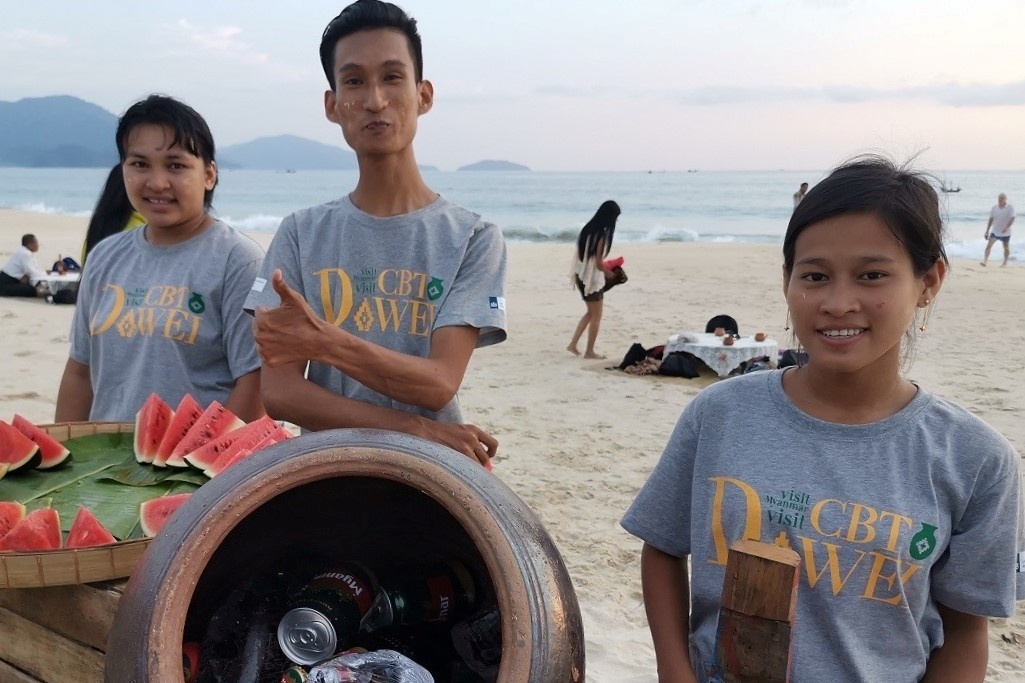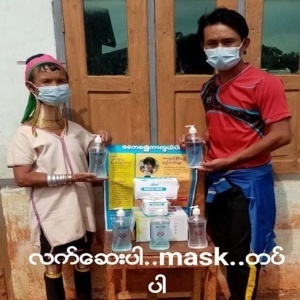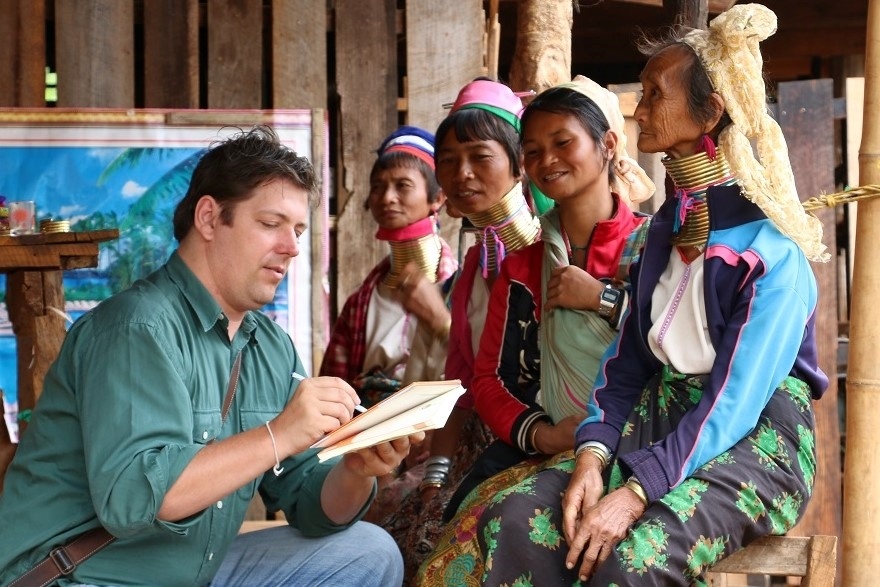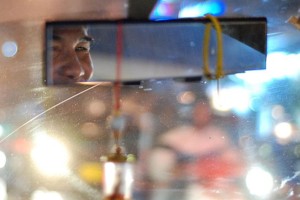A community-based tourism dilemma: COVID’s ‘new normal’ vs ‘back to normal’

Skål recently recognised the International Trade Centre’s Myanmar Inclusive Tourism Project with a sustainable tourism award. In this “Good Tourism” Insight, Project consultant Peter Richards describes the pre-pandemic promise of new community-based tourism products, their challenges now, and how communities are handling COVID safety concerns as they consider reopening.
At the start of 2020, the future looked very promising for the Myanmar Inclusive Tourism Project, which is funded by The Netherlands and implemented by the UN International Trade Centre. Following five years of hands-on work alongside local community members, tour operators, and tour guides with a passion for local experiences, our team of national and international consultants had celebrated two significant achievements: a successful third season for inclusive, community based tourism (CBT) in Kayah state, and a successful familiarisation (FAM) trip to explore new CBT experiences in the emerging destination of Dawei, Tanintharyi Region.
In 2014, when our project started, Kayah state offered almost no activities for tourists. Between 2015 and 2020, ITC worked with stakeholders to implement a rigorous, step by step process of community consultation, product development and B2B marketing. This included work with local communities, ground handlers and tour guides, national DMC’s, and EU tour operators. By the end of 2019, international arrivals to Kayah state had grown by 390% to 12,973 visitors. Kayah’s market share had grown by 150%. Inspiring, new community-based experiences developed by ITC had been key to this responsible tourism success story.
New community-based tourism tours included the chance to experience Pan Pet, homeland of the iconic ‘Long Neck’ Kayan, and Hta Nee La Leh, an ethnic Karenni community. In 2019, 35% of international visitors to Kayah joined one of the CBT tours. A total of 4,409 visitors enjoyed authentic experiences of local life, culture, and nature in Pan Pet and 3,487 visitors experienced CBT in Hta Nee La Leh.
These tours generated more than USD 35,000 income for village service providers that year, while catalyzing additional business ~ USD 650,000 or more for Loikaw tourism businesses. Between 2016 and 2019, the value of new business for local Kayah SME tourism suppliers, based only on tour programs that included ITC CBTs, is estimated to be more than USD 1.4 million.
In CBT Supply Chain Handbook: Fresh From The Field, our team summarised our practical experiences in the field and at the fairs working to develop and market these community-based tours through tourism supply chains.
Meanwhile, down south, 28 tour operators sampled the new destinations of Ka Lone Htar and Tizit, enjoying innovative CBT experiences that had been crafted for more leisure-orientated markets. These included a beach picnic at sunset in Tizit, a small fishing community, and a nature trek and barefoot forest spa experience in Ka Lone Htar, an orchard community. Following the FAM trip, more than 90% of the tour operators stated that they intended to offer the new tours to their guests.
And then 2020
While COVID has been a disaster across sectors, it has decimated our industry.
In the second quarter of 2020, our discussions and recovery plans still allowed some hope for the year. While we didn’t expect that our CBT communities would be able to welcome long haul, international travelers before 2021, we did expect that discussions about ‘travel bubbles’ and ‘travel bridges’ would bear fruit and facilitate at least some regional travel from neighbors like Thailand and Vietnam. Now, in early November 2020, Myanmar is deep into a second wave of COVID. We face a harsh reality that COVID’s impact on tourism may stretch much further into the future.
In Myanmar, domestic tourism has had some fleeting moments of recovery over the past months. Lulls in lockdown have seen people eager to travel, including visits to rural areas and communities. However, these bursts of freedom have also brought the dilemma of CBT in the era of COVID into full and complex focus: How do we balance the “new normal” with the wish to return to normal?
For those who work at the crossroads of community development and tourism, realising community benefits from tourism is both an aspiration and a mantra. Many tourism professionals are sincerely committed to delivering local benefits alongside great experiences for their guests. Projects like the Myanmar Inclusive Tourism Project seek to demonstrate how to make that happen. However, as tourism attempts to restart, we find that COVID’s new normal disrupts old assumptions at the deepest levels.
Tourism SMEs working at the local level, such as local tour guides, ground handlers, and local hotels, are suffering a total lack of income. They are in desperate trouble, going broke. Meanwhile, local communities, with one foot in agriculture, find that their relative self-sufficiency can provide some protection from COVID.
In the COVID-19 tourism wasteland, tour operators and guides are understandably very eager to move from ‘new normal’ to ‘back to normal’. Businesses are motivated to get community tours up and running again as quickly as possible.
Meanwhile, communities, often both cash poor and physically distant from good quality health care, can be much less enthusiastic to welcome visitors. In ITC’s own partner communities, we hear a mixture of concern and enthusiasm about once again welcoming visitors. Some partner communities have informed our team that they will definitely not open to visitors again until 2021.
Preparing community-based tourism for restart
At ITC, we fundamentally respect the communities’ right to stay safe. At the same time, we are preparing for when tourism can gradually restart. With this in mind, ITC’s Myanmar Inclusive Tourism team joined hands with a sister ITC project, the SECO – UN Cluster on Trade and Productive Capacity, Myanmar project, which is developing inspiring local experiences in Southern Shan State. Together, we worked to develop new COVID Safety Guidelines for Community Visits.

The guidelines provide very simple advice for the key actors who need to work as a team to keep community members, tourists, and tourism staff safe from COVID. They are illustrated with simple cartoons to help those with limited literacy. Key recommendations include keeping activities outside, maintaining physical distance, and wearing masks while preparing and serving food.
Our team are now waiting for the opportunity to train community and business partners about the new guidelines, adapt programs, and, based on community consent, restart CBT with selected domestic tourism markets.
At the end of this process, the final irony, and perhaps the greatest opportunity is that, with tourists, tour guides, and community members all masked up, socially distancing, and sanitising their hands, we finally see the universality of our human challenges.
CBT tours are often marketed as the achievement of ‘authenticity’ based on the ‘discovery’ of an imagined, bucolic past that often bears little relation to local realities. Now, with all of us very much ‘in the same boat’, this myth is exposed and disrupted.
Together, in the cauldron of 2020, more nuanced encounters with local people may finally be possible. I’m looking forward to a future where fun-loving Kayan ladies, wearing their iconic brass neck rings, enjoy sitting with visitors from around the world, sharing a jolly good moan about COVID!
P.S. Are you a tour operator, interested to help us restart great local experiences, with real local benefits in Myanmar? Please contact me at peter.e.richards@gmail.com.
What do you think? Share a short anecdote or comment below. Or write a deeper “GT” Insight. The “Good Tourism” Blog welcomes diversity of opinion and perspective about travel & tourism because travel & tourism is everyone’s business.
Featured image (top of post): Community-based tourism Myanmar. “CBT. Visit Myanmar. Visit Dawei.” Pre-COVID picture. Supplied by author.
Downloads
- COVID Safety Guidelines for Community Visits (PDF hosted off-site), NTFIV Myanmar Inclusive Tourism Project, 2020
- CBT Supply Chain Handbook: Fresh From The Field (PDF hosted off-site), NTFIV Myanmar Inclusive Tourism Project, 2020
About the author

Peter Richards has 20 years of professional experience in the Greater Mekong Subregion, working at the crossroads of responsible tourism and community development. He has worked in the private and NGO sectors; with stakeholders including governments, tourism associations, tour operators, guides, local communities, hotels, and restaurants.
Since 2015, Peter’s main role has been as Consultant on Cultural Tourism Development and Market Access for the International Trade Centre’s Myanmar Inclusive Tourism project in Kayah State, Eastern Myanmar, and Dawei District, Tanintharyi region, Southern Myanmar. His core skills include sustainable tourism project development and management; participatory training; facilitating market access partnerships between local communities and tourism businesses; and sustainable tourism standards development and auditing.
In 2015, Peter earned a MSc with Distinction in Responsible Tourism Management, and won the UK Association for Tourism in Higher Education’s Prize for Best Post Graduate Student of Tourism. He regularly lectures on tourism and community development, and facilitates study tours and field research for students and professionals.
Peter also works with his wife, Premruethai, to operate the award winning The Family Tree store in Hua Hin, Thailand, which supports more than 40 Thai community groups, local artists, social and environmental initiatives.





